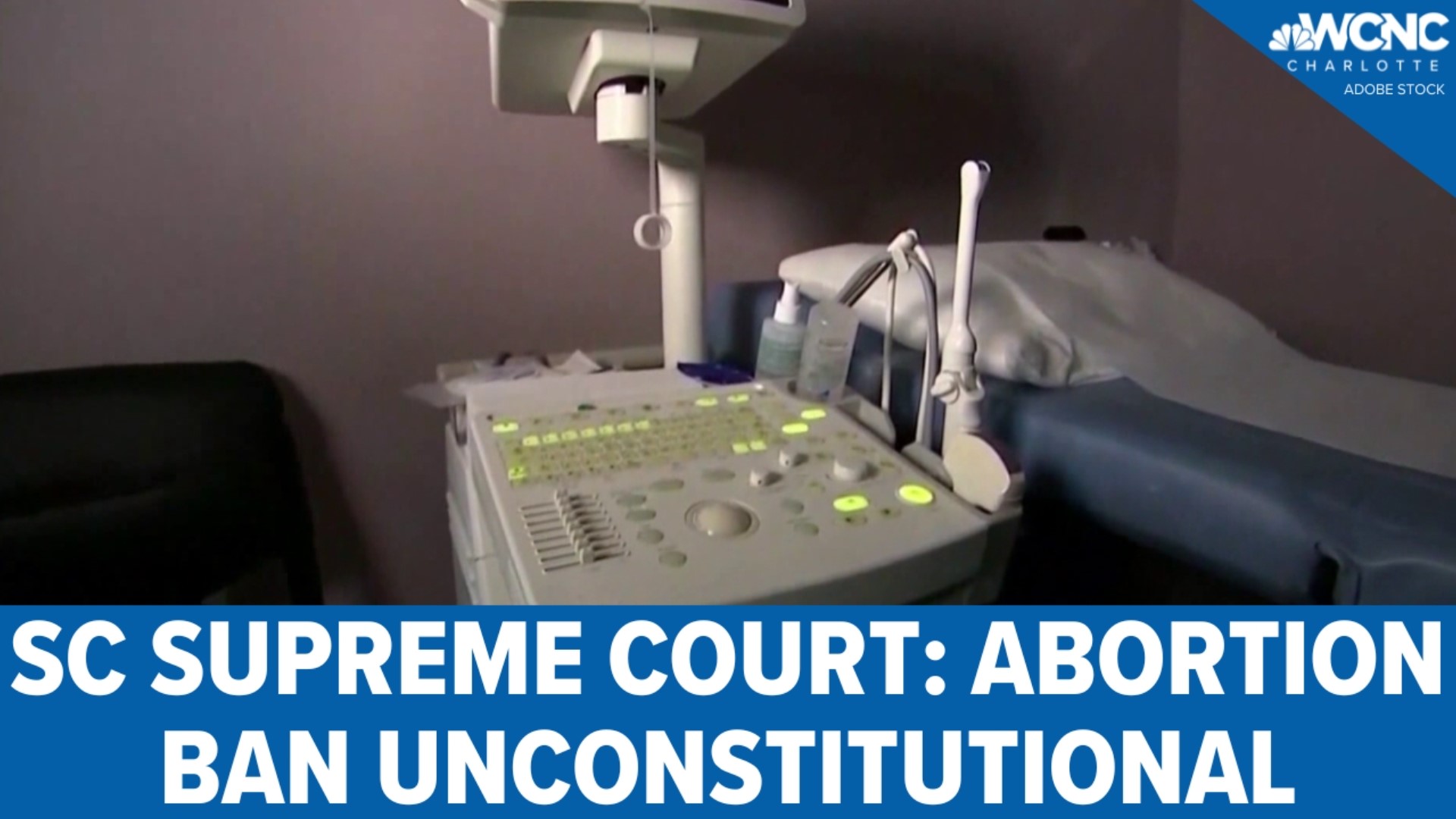COLUMBIA, S.C. — The South Carolina ban on abortions after cardiac activity is no more after the latest legal challenge to the state's 2021 law proved successful.
The state Supreme Court ruled Thursday that the restrictions violate the state constitution’s right to privacy. The measure banned abortions after cardiac activity is detected, typically around six weeks into a pregnancy, with exceptions for those caused by rape and incest or endangering the patient’s life.
“The State unquestionably has the authority to limit the right of privacy that protects women from state interference with her decision, but any such limitation must be reasonable and it must be meaningful in that the time frames imposed must afford a woman sufficient time to determine she is pregnant and to take reasonable steps to terminate that pregnancy. Six weeks is, quite simply, not a reasonable period of time for these two things to occur, and therefore the Act violates our state Constitution's prohibition against unreasonable invasions of privacy," Justice Kaye Hearn wrote in the majority opinion.
South Carolina bars abortion at 20 weeks.
The decision comes nearly two years after Republican Gov. Henry McMaster signed the measure into law. The ban drew lawsuits almost immediately. Since then, legal challenges have made their way through both state and federal courts. Varying orders have given the law’s supporters and opponents both cause for celebration and dismay. Those seeking abortions in the state have seen the legal window expand to the previous limit of 20 weeks before returning to latest restrictions and back again.
After the ban was struck down, McMaster railed against the ruling, and said he would work with the General Assembly on further action.
"Our State Supreme Court has found a right in our Constitution which was never intended by the people of South Carolina. With this opinion, the Court has clearly exceeded its authority. The people have spoken through their elected representatives multiple times on this issue," said McMaster.
McMaster's thoughts were echoed by Rep. Ralph Norman, whose federal congressional district includes York, Lancaster, and Chester counties. Norman called the decision "disappointing" and expressed optimism the ban could be reinstated.
"South Carolinians have made their voices clear that we should protect life in its most vulnerable state, and I hope the South Carolina Legislature and Governor McMaster will explore ways to lawfully reinstate this important pro-life legislation. I have faith this will only be a brief step backward in our ongoing efforts to protect life," Norman said in a statement to WCNC Charlotte.
South Carolina Democrats, in contrast, praised the court's decision. State House Minority Leader Rep. Todd Rutherford said this was a victory for reproductive rights in the Palmetto State.
"We stood against this bill at every turn at the State House and will continue to fight against every attempt to restrict a woman’s control over her own body," he said in a statement. "If Republicans choose to continue this war on women - knowing the court’s position - they are deliberately wasting taxpayer dollars and time, because there are pressing issues facing our state that cannot afford to be sidelined.”
Federal courts had previously suspended the law. But the U.S. Supreme Court’s overturning of Roe v. Wade allowed the restrictions to take place — for just a brief period. The state Supreme Court temporarily blocked it this past August as the justices considered a new challenge.
The high court's momentous decision in Dobbs v. Jackson Women's Health Organization set off a flurry of activity at the state level. Republican-dominated states moved forward with new restrictions while abortion rights' advocates sought additional safeguards. With federal abortion protections gone, Planned Parenthood South Atlantic sued in July under the South Carolina constitution’s right to privacy. Meanwhile, other states have seen challenges to restrictions as a matter of religious freedom.
In South Carolina, lawyers representing the state Legislature have argued that the right to privacy should be interpreted narrowly. During oral arguments this past October, they argued historical context suggests lawmakers intended to protect against searches and seizures when they ratified the right in 1971. Planned Parenthood attorneys representing the challengers have said the right to privacy encompasses abortion. They argued previous state Supreme Court decisions already extended the right to bodily autonomy.
The justices’ limited ruling left the door open for future changes. The state House and Senate failed to agree on additional restrictions during this past summer’s special session on abortion. Still, a small but growing group of conservative lawmakers have vowed to push that envelope once more this legislative session — despite some Republican leaders’ insistence no agreement is possible.
___
The Associated Press contributed to this report.
James Pollard is a corps member for the Associated Press/Report for America Statehouse News Initiative. Report for America is a nonprofit national service program that places journalists in local newsrooms to report on undercovered issues.

